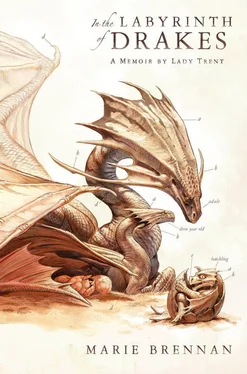The eggs were nearly spherical, which is common among birds that lay their eggs in holes (where there is no risk of them rolling away). Their colour was pale and sandy, but speckled here and there with darker spots, like the eggs of sand grouse—in both cases, we surmised, as camouflage against predators that sought to find and raid the nests. The shell had become hard since the laying, which is not universal among dragons: some lay leathery eggs, like those of reptiles, but others are more like those of birds. The hatching drakes used an “egg tooth” to break through the shell; this is actually a specialized scale, and is shed soon after birth.
Where our observations diverged most from those of Lord Tavenor was in the matter of the shell membrane. This was a good deal thicker than he had reported, and it became apparent that before the drakes broke free of their shells, they had to shred that membrane. “Why so thick, do you think?” Tom asked me without ungluing himself from his field glasses.
“Perhaps it is a holdover from the more leathery type of egg,” I said, propping myself up on one elbow so I could sketch with the other hand. “The harder shell could have developed in response to environmental factors, but the more flexible interior remained.”
It was a nice theory, and I held to it for many years. Tom eventually conducted experiments, however, that gave us a more accurate explanation: the inner membrane of a desert drake egg is a highly specialized material that responds to heat. This connects to the yolk by means of the chalaza, the thready component one sees upon pouring an egg into a glass, and actually supplies the drake with energy supplementing that of the yolk itself. At the time we did not know this, though. All we knew was that the drakes showed a surprising amount of vigor upon emerging from their shells, and were soon stumbling about without having been fed a single thing.
There are few things more hideous and adorable than the newly born of any species. The drakes had the benefit of scales, which kept them from looking like raw flesh the way so many avian hatchlings do; but they were gawky and pale, and much prone to plowing their faces into the sand when their weight got ahead of their feet. Far from cannibalizing one another, they showed a startling degree of sociability: as night fell, they gathered together among the remnants of their shells, forming a pile to keep themselves warm.
Tom and I had to retreat from the plateau before the light was entirely gone. We were not much more graceful than the drakes as we made our way down to our camp on the canyon floor, and without my observations to distract me, I felt in full the consequences of a day spent under the sun’s merciless eye. Though I did not say it to anyone at the time, I was more physically wretched than I had been when the Banu Safr kidnapped us—albeit less sunburnt. I drank every drop of water Suhail gave me and passed out on my bedroll, too tired even for the whirl of my thoughts to keep me awake.
* * *
Even so, I found myself rousing again about two hours later. A sound had disturbed my sleep, quiet and low, but persistent. When I rolled over, I found Suhail was sitting up, arms loosely linked across his knees. “What is that?” I whispered.
“I think it is the drakes,” he said.
It was a steady, soothing hum, in shifting chords as voices dropped out and came back in. The result was not precisely musical—even I, not blessed with much sense of pitch, could tell the various notes conflicted at times—but it was beautifully eerie in its way, like the howling of wolves, but gentler. “They are… singing to one another?”
Even in the darkness, I could make out his smile. “Purring, perhaps. Like cats. There are stories of this, but I’ve never heard it myself.”
After a moment he lay down again, and I pillowed my head on his shoulder. I cannot tell you how long I listened to their aimless song; it followed me into sleep and shaped my dreams. But those moments, however many there may have been, have remained in my memory as among the most priceless of my life: enduring a rough camp in the Labyrinth of Drakes, with a man I loved warm at my side, listening to the dragons sing.
* * *
Three days passed before we could investigate the nest directly, which is the length of time it took for the drakes to abandon it for good. I will not trouble my readers with too many details of this period, as it is all but prelude to what came next; I will say only that the time was physically unpleasant, for we were down to our last mouthfuls of water, barely enough to keep body and soul together, and I no longer had the joy of new discovery to distract me.
Fortunately Andrew and al-Jelidah returned on the third afternoon, bearing as much water as they could harvest from the spring without draining it or keeping us waiting for too long. Even then I could not drink my fill—but that water, bitter and goat-flavoured though it was, tasted more glorious than the finest wine.
“Do we want to look for another nest?” I asked Tom.
He thought about it, biting his lip, then finally shook his head. “By the time we find one, it may well have hatched. And we’ve pressed our luck rather far already.” Jackals had gone after the camels on the trip to the spring, and my brother had been forced to hide in a crevice to avoid a drake that had woken briefly from its slumber. Suhail had found another lair not far from our current location; we all had our fingers crossed that the dragon there would remain in estivation until we departed. No doubt Tom was thinking of all of these things when he said, “I’d rather finish this one properly, then head back.”
We had missed the hatchings at Dar al-Tannaneen (in favour of seeing the natural version out here), but we could do some good with the new drakes. “As much as I hate to say it, I agree. Let us see if the drakes are gone yet: if they are, we might leave as early as today.”
The last of the drakes had indeed departed. They were sufficiently harmless at this stage that Tom had followed two of them when they wandered off the previous day, watching their first, inept efforts at hunting, but in that terrain we could not afford to pursue them far. A corner of my mind was already considering what sort of preparation would be necessary to observe juveniles out here—but whatever the answer might be, it certainly amounted to more preparation than we had made. I therefore turned my attention to the remnants of their nest, which at least had the courtesy to stay in one place.
Bits of shell were scattered all over. Initially we left these where they lay, scrutinizing the cup of sand from all edges before stepping into it and disturbing the tracks of the drakes. Then we began to gather up the shards. Among them we found a few shreds of membrane, which had escaped the notice of the hatchlings; most of that material had been eaten. We had brought a small quantity of formaldehyde with us, sufficient to preserve the soft tissues of one hatchling (if occasion arose); we used it instead for the membrane, so we could study it at leisure back in Qurrat.
Because this was the sole hatching we had been able to observe, we wanted to be thorough. We gathered up every last scrap of shell we could find—uncovering evidence that the site had been used more than once—and when that was done, I sat for a time in the cup, running my hands through the sand to make certain we had not missed any.
My fingers brushed stone.
This should not have been unusual. I sat atop a great pile of stone, after all; it stood to reason there would be some at the bottom of this cup. But that should have been rough, and what I touched was flat and smooth.
Curious, I dug away some of the sand to see. This was easier said than done, as sand of course tends to slide right back to the bottom of any hole; but I was able to find what I had touched. It was indeed quite flat—not a figment of my tactile imagination, brought on by too much sun. And as I ran my hand across it, my fingertips found an edge.
Читать дальше












